

Nicol and Macfarlane Dick - REAP Principles. PeerMark Overview. PeerMark™ is the new peer review assignment tool.
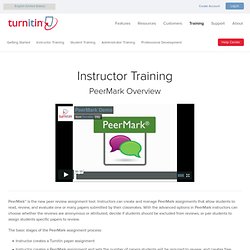
Instructors can create and manage PeerMark assignments that allow students to read, review, and evaluate one or many papers submitted by their classmates. With the advanced options in PeerMark instructors can choose whether the reviews are anonymous or attributed, decide if students should be excluded from reviews, or pair students to assign students specific papers to review. The basic stages of the PeerMark assignment process: Distribution of Peer Reviews PeerMark assignments may use or mix the following methods of distribution of the papers to be reviewed:
PeerWise. REAP > PEER. "..if we want students to develop critical thinking, judgement and autonomy in assignment production they should be provided with high-level evaluative experiences similar to those of experts.
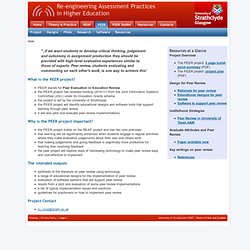
Peer review, students evaluating and commenting on each other's work, is one way to achieve this' What is the PEER project? PEER stands for Peer Evaluation in Education Review the PEER project has received funding (2010-11) from the Joint Information Systems Committee (JISC) under its Innovation Grants scheme the project is led by the University of Strathclyde the PEER project will identify educational designs and software tools that support learning through peer review it will also pilot and evaluate peer review implementations Why is the PEER project important?
REAP > Home. Using technology to encourage student engagement with feedback: a literature review. Using technology to encourage student engagement with feedback: a literature review Stuart Hepplestone, Graham Holden, Brian Irwin, Helen J.
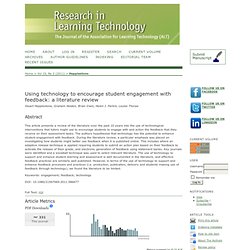
Parkin, Louise Thorpe Abstract This article presents a review of the literature over the past 10 years into the use of technological interventions that tutors might use to encourage students to engage with and action the feedback that they receive on their assessment tasks. The authors hypothesise that technology has the potential to enhance student engagement with feedback. Keywords: engagement; feedback; technology Full Text: PDF Article Metrics PDF Downloads 331This journal Metrics powered by PLOS ALM.
Tutoring on-line - ALT_Wiki. Initial Authors Gilly Salmon & Mike Keppell Background/Definitions Within Higher Education, tutoring is considered to be adult-to-adult guidance within a specific course/subject for the clear purpose of advancing learning competence in an area of study.
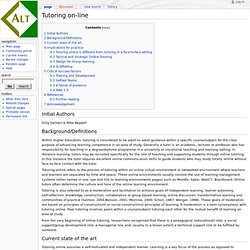
Generally a tutor is an academic, lecturer or professor who has responsibility for teaching in a degree/diploma programme in a university or vocational teaching and learning setting. In distance learning, tutors may be recruited specifically for the role of teaching and supporting students through online tutoring. Tutoring online refers to the process of tutoring within an online virtual environment or networked environment where teachers and learners are separated by time and space. From the very beginning of online tutoring, researchers recognised that there is a pedagogical (educational) role, a social support/group development role, a managerial role and, usually to a lesser extent a technical support role to be fulfilled by someone.
Technology-supported assessment - ALT_Wiki. Initial Author David Nicol Background and Definitions Assessment is a complex process in formal learning contexts.
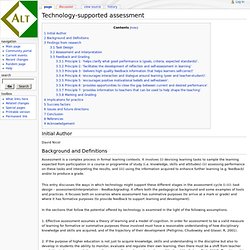
It involves (i) devising learning tasks to sample the learning expected from participation in a course or programme of study (i.e. knowledge, skills and attitudes) (ii) assessing performance on these tasks and interpreting the results, and (iii) using the information acquired to enhance further learning (e.g. feedback) and/or to produce a grade.
Effective Assessment in a Digital Age. Materials are now available from the series of workshops based around the JISC Effective Assessment in a Digital Age publication.
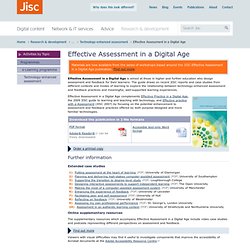
Find out more1 Effective Assessment in a Digital Age is aimed at those in higher and further education who design assessment and feedback for their learners. The guide draws on recent JISC reports and case studies from different contexts and modes of learning to explore the relationship between technology-enhanced assessment and feedback practices and meaningful, well-supported learning experiences. 2Effective Assessment in a Digital Age complements Effective Practice in a Digital Age3, the 2009 JISC guide to learning and teaching with technology, and Effective practice with e-Assessment4 (JISC 2007) by focusing on the potential enhancement to assessment and feedback practices offered by both purpose-designed and more familiar technologies. Order a printed copy10 Further information Extended case studies Online supplementary resources Find out more21.
ALT-C 2007: beyond control - Dylan William. Visit the web site of ALT-C 2008: Rethinking the digital divide, for which the closing date for submissions is 29 February 2008.
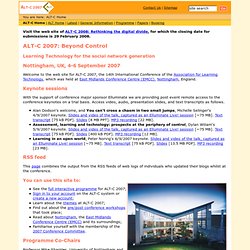
Learning Technology for the social network generation Nottingham, UK, 4-6 September 2007 Welcome to the web site for ALT-C 2007, the 14th International Conference of the Association for Learning Technology, which was held at East Midlands Conference Centre (EMCC), Nottingham, England. Keynote sessions With the support of conference major sponsor Elluminate we are providing post event remote access to the conference keynotes on a trial basis. Alan Dodson's welcome, and You can't cross a chasm in two small jumps, Michelle Selinger's 4/9/2007 keynote. RSS feed This page combines the output from the RSS feeds of web logs of individuals who updated their blogs whilst at the conference.
You can use this site to: Programme Co-Chairs Keynote speakers Theme speakers Keeping informed about future ALT Conferences Note. Technology-supported assessment - ALT_Wiki.